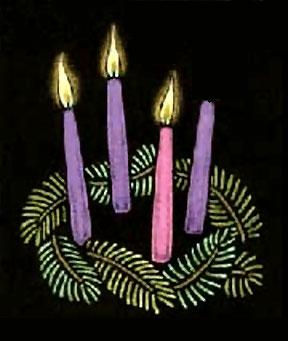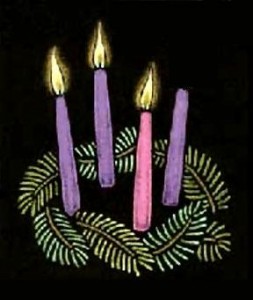An Advent Reflection by R. Ward Holder
“…Where is the child who has been born king of the Jews?…” (Matthew 2.2) That was the question that the magi asked in Jerusalem. And the response was surprising – for a people who had longed for centuries for the true deliverance that the redeemer would bring – this question brought no rejoicing, but rather fright, consternation, and questioning. Why? What did it mean for the one who was born to be born in Bethlehem? Further, what does it mean to us that Jesus the Christ was born in Bethlehem?
In a way of course, it made sense to the Jews of Herod’s time that the messiah would be born in Bethlehem. Besides the prophecy in Micah, a strong theological current running through both the prophets and histories of the Jewish scriptures was the Davidic covenant. Isaiah had prophesied that a “shoot shall come out from the stump of Jesse.” (Isaiah 11.1) The Lord had given a promise to David that the Lord would establish the throne of the kingdom of David’s heir forever. (II Samuel 7.12-16) Further, as the Jews in Palestine were living as a conquered people, an heir to the greatest warrior-king, who might kill ten thousands of their oppressors was a beautiful dream. Both political realities and ancient scriptures pointed to Bethlehem.
But in another way, Bethlehem made no sense. Bethlehem was not Jerusalem, a shining city on a hill. Bethlehem was a slum, a village of little favor. Bethlehem was the wrong-side of the tracks to Jerusalem’s glory. Naturally those looking for a king went to the capital, but Jesus was not there.
Why Bethlehem?
But what else did it signal about Jesus’ life and work that he was born in Bethlehem? Bethlehem was a small village south of Jerusalem, a place that had little claim to fame, or wealth or prominence. Bethlehemites probably clung desperately to that prophecy in Micah that their town was not the least among the princes of Judah. (Micah 5.2) Today, Bethlehem is inside of the area of the West Bank governed the Palestinian Authority, an area of grinding poverty and hopelessness. The unemployment rate is almost 18%, and 46% of households live below the poverty line. (CIA Factbook) The point is, when Jesus was born, and today, Bethlehem was not a glamourous place. It was and is the definition of the wrong-side of the tracks. It was the wrong side of town, the Cabrini-Green of Chicago, the Bedford Stuyvesant of New York, the Roxbury of Boston.
And God chose for the savior of the world to be born there. From the very first moment of the Jesus event, the redeemer chose to be in the areas we choose to avoid if we can. The stark opposition of God’s values to human values could hardly have been painted more clearly. Martin Luther wrote of the theologia crucis, the theology of the cross. He argued that instead of a theology of glory, the message of the cross was that God’s evaluation of the world opposed humanity’s – that instead of money and power, God chose and chooses poverty and meekness. But that theology of the cross did not begin on Calvary! Jesus valued the creative resilience of those who lived in the downtrodden walks of life. He demonstrated his own acceptance of that resilience in his own life, seeking continually to live through divine values, and embracing them. Jesus valued humility – living among those who had no power in this world. Jesus valued sacrifice – seeing the daily surrenders that made life possible. Jesus valued dependence – choosing day after day to live life in a radical reliance on his heavenly father. Jesus valued love – the love that does not confuse itself with the tattered rags of costly yet unprecious gifts.
The proper response to the Christ is either faith or offense.
God chose Jesus’ life to begin in a judgment of our values. Søren Kierkegaard wrote that the proper response to the Christ could only be either faith or offense. If a human being understands who the Christ actually is – those are the only two possible stances. There is no middle way – indifference to the Christ simply means a misunderstanding. Offense, because the life and message of the Christ judges our human values, our human desires, and our human foibles. Faith, because in the Christ, we meet that person who offers an exchange that is so awe-inspiring that we joyfully leave our lives behind to accept his.
In the Book of Confessions of the Presbyterian Church (USA), the Confession of 1967 notes that the reconciling work of Jesus was “the supreme crisis in the life of mankind.” Jesus’ life and ministry judge not only our sins and evil, but our righteousness. This Advent season, as in all of those past and those to come, humans are faced with a choice. A gift is offered to us, but it is extraordinarily costly. Will we choose it? My own family is in the midst of figuring out Christmas lists, planning budgets, attempting to calculate how much over budget we will go. While it seems chaotic and random, we’ve actually gotten quite good in our own way at estimating costs of presents. But how good are humans at calculating the cost of discipleship? The American dream that so many of us seek draws us away from the Bethlehem reality, seeking to insulate ourselves from the world’s poor, and meek, and dependent by a fortress whose secure walls are made up of the values of this world.
God’s choice to save the world from Bethlehem demands believers’ acceptance of the values of poverty, humility, and dependence on God. If we would be Jesus’ disciples, then our path should be to Bethlehem, and to our nearer Bethlehems. As we stumble through yet another
Advent we must remember that to seek the Christ, we must go to Bethlehem – the place of poverty, stigma, dependence, and God’s love.


